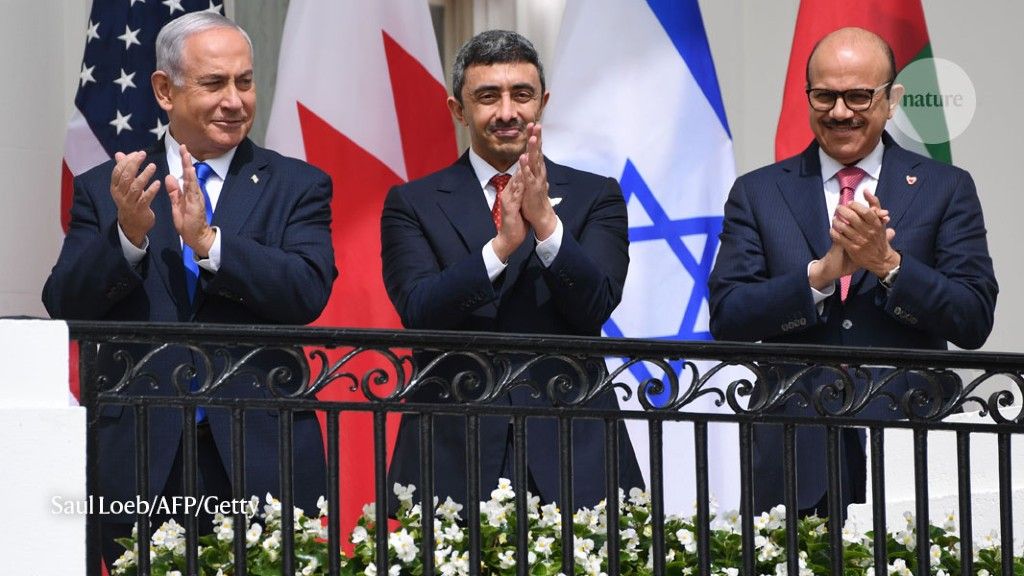The New Israeli-Arab Extraterrestrial Accords
Article by Sam Rutzick September 17, 2020 (reason.com)
• The September 15th Middle Eastern ‘Abraham Accords’ formally normalized Israel’s relationship with both Bahrain and United Arab Emirates. As part of the accords, former rivals Israel and United Arab Emirates have agreed to cooperate in space exploration. In the accords, the signatories pledge a “common interest in establishing and developing mutually beneficial cooperation in the field of exploration and use of outer space for peaceful purposes,” which may include “joint programs, projects, and activities.”
• Both Israel and the United Arab Emirates have thriving space programs. The Israeli Space Agency has launched a number of satellites, including the Beresheet Lander sent to the Moon in 2019. Unfortunately, the lander crashed into the lunar surface due to a mechanical error. But the fact that the Israeli Space Agency was able to get that close is significant. The only other nations who have been able to get that close to the lunar surface are the Americans, the Chinese, and the Russians.
• The Emirati space program is also significant. Its Al-Amal (Arabic for “Hope”) satellite was launched in July and is expected reach Mars in February where it will monitor Martian weather patterns.
• On August 17, even before the Abraham Accords were signed, Israeli Minister of Science and Technology Izhar Shay said that cooperation was “imminent” and that “[t]he infrastructure is there for the commercial engagements for the sharing of know-how and mutual efforts.” The Israeli lander technology and the Emirates’ Mars shot could combine to culminate in a Mars landing. Emirati and Israeli astronauts plan to join the US on an Artemis moon mission, and the two nations may launch a joint mission to explore the dwarf planet Ceres.
• Clearly, space exploration is no longer the exclusive realm of the world’s superpowers. And whatever objections one might have to spending public dollars on space, scientific cooperation is certainly preferable to political rivalry.

The new Middle Eastern accord quite literally reaches for the stars. As part of the deal, inked earlier this week, Israel and United Arab Emirates have committed to cooperate in space exploration.
The Abraham Accords, signed September 15, formally normalized Israel’s relationship with both Bahrain

and United Arab Emirates. While geopolitical concerns have dominated both the substance of the accords and media coverage of the deal, the signatories also pledged a “common interest in establishing and developing mutually beneficial cooperation in the field of exploration and use of outer space for peaceful purposes,” which may include “joint programs, projects, and activities.”
Both Israel and the United Arab Emirates have thriving space programs. The Israeli Space Agency, founded in 1982, has launched a number of satellites—most notably, in 2019, the Beresheet Lander to the moon. Co-designed and built by the Israeli companies SpaceIL and Israeli Aerospace Industries, Beresheet was launched on a SpaceX Falcon 9 rocket and made it all the way to the Moon for less than $100 million dollars.
Unfortunately, the Beresheet lander crashed into the lunar surface due to a mechanical error. Still, the fact that the Israeli Space Agency was able to get that close is significant. The only other nations who have been able to get that close to the lunar surface are the Americans, the Chinese, and the Russians.
FAIR USE NOTICE: This page contains copyrighted material the use of which has not been specifically authorized by the copyright owner. ExoNews.org distributes this material for the purpose of news reporting, educational research, comment and criticism, constituting Fair Use under 17 U.S.C § 107. Please contact the Editor at ExoNews with any copyright issue.
